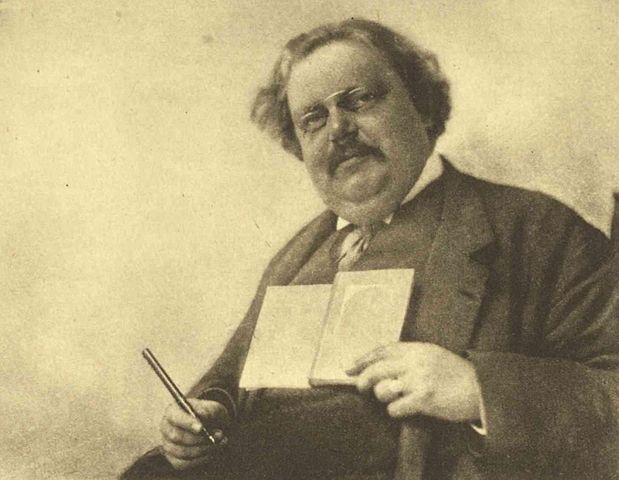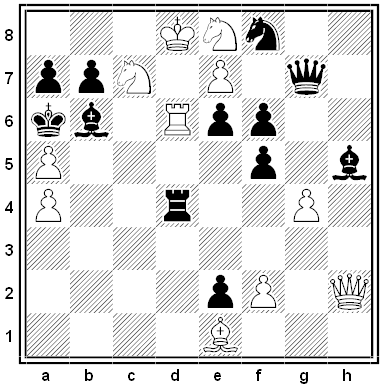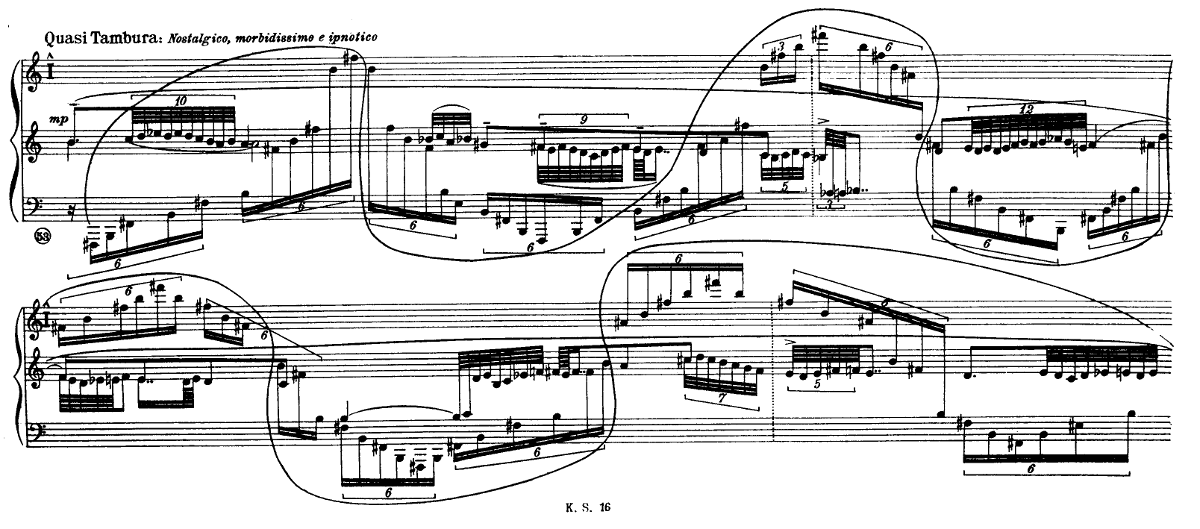
G.K. Chesterton stood 6 foot 4 and weighed 286 pounds.
During the First World War a lady in London asked why he was not out at the front.
He said, “If you go round to the side, you will see that I am.”

G.K. Chesterton stood 6 foot 4 and weighed 286 pounds.
During the First World War a lady in London asked why he was not out at the front.
He said, “If you go round to the side, you will see that I am.”

From T.R. Dawson, a logic problem posing as a chess puzzle. If pinned men do not check, how can White mate in two moves?

Here’s how the Union enciphered its messages during the Civil War. Abraham Lincoln sent this dispatch on June 1, 1863:
GUARD ADAM THEM THEY AT WAYLAND BROWN FOR KISSING VENUS CORRESPONDENTS AT NEPTUNE ARE OFF NELLY TURNING UP CAN GET WHY DETAINED TRIBUNE AND TIMES RICHARDSON THE ARE ASCERTAIN AND YOU FILLS BELLY THIS IF DETAINED PLEASE ODOR OF LUDLOW COMMISSIONER
The first word, GUARD, indicates the size of a containing rectangle and the paths on which the words must be laid out to decipher the message. In this case, they’ll go up the first column, down the second, up the fifth, down the fourth, and up the third. Also, just to confuse the Confederates, every eighth word after GUARD is a null and should be discarded. So we get:
FOR VENUS LUDLOW RICHARDSON AND BROWN CORRESPONDENTS OF THE TRIBUNE WAYLAND AT ODOR ARE DETAINED AT NEPTUNE PLEASE ASCERTAIN WHY THEY ARE DETAINED AND GET THEM OFF IF YOU CAN ADAM NELLY THIS FILLS UP
The last steps are to remove THIS FILLS UP, which is only there to fill out the block, and to replace a few code words:
VENUS = colonel
WAYLAND = captured
ODOR = Vicksburg
NEPTUNE = Richmond
ADAM = President of the United States
NELLY = 4:30 p.m.
That gives us the final message:
For Colonel Ludlow,
Richardson and Brown, correspondents of the Tribune, captured at Vicksburg, are detained at Richmond. Please ascertain why they are detained and get them off if you can.
The President, 4:30 p.m.
This system was such a valuable source of breaking news that Lincoln often visited the military telegraph office in the War Department, next to the White House, and would chat with the operators there. One of them, David Homer Bates, who was only 18 when the war started, remembered, “Outside the members of his cabinet and his private secretaries, none were brought into closer or more confidential relations with Lincoln than the cipher-operators, … for during the Civil War the President spent more of his waking hours in the War Department telegraph office than in any other place, except the White House. … His tall, homely form could be seen crossing the well-shaded lawn between the White House and the War Department day after day with unvaried regularity.”
(From David Kahn, The Codebreakers, 1996.)

“Those praised in a book take that praise, and more, as their due. What you meant as a gift is accepted as an obligation. In a second printing of one of his books, a writer listed the misprints in the first. Among them was the dedication.” — Baltasar Gracián

Between 1937 and 1939, Nazi Germany built a colossal beach resort on the island of Rügen in the Baltic Sea. Its scale was enormous: Meant to host 20,000 holiday-makers at a time in shifts of 10 days, the six-story edifice of 10,000 double rooms stretches for 4.5 kilometers, requiring almost an hour to walk its length. At the end of the war seven of a planned eight blocks and part of a main square had been completed. Since then it’s housed small-scale projects, including a youth and a family hostel, a skating hall, a theatre, workshops, museums, art galleries, secondhand shops, and a disco. Today five of the blocks have been developed as apartments and a new hostel, while the remaining three lie in ruins.

Until four years ago, fully 1 percent of Greenland’s population was housed in a single building, Blok P. Erected in the 1960s, it was five stories high and stretched 200 meters, the largest construction project in the Kingdom of Denmark, with one end boasting the world’s largest flag of Greenland. But its poor design made the building a difficult and depressing home for its residents, and it was demolished in 2012.

Before the Turkish invasion of Cyprus in 1974, the tourist district of Varosha was the nation’s premier vacation destination, with high-rise hotels, shopping centers, restaurants, and nightclubs. With the invasion, the entire population of 39,000 fled, leaving behind an opulent ghost town. Since then it’s been fenced off, accessible only by the Turkish military and United Nations personnel. Negotiations continue, but after 40 years of mounting disrepair it’s not clear how much of it might still be salvaged.
(Thanks, Matthias and Steve.)

Tom has a crystal ball that shows him the future. One day it shows him a bomb going off in the city. He alerts the authorities, who disable the bomb, saving millions of people. Tom is glad, but he wonders: How can this outcome be logically consistent with the future that the crystal ball had shown him? In that future he saw millions of people die, but in this future they’re still alive. He realizes that when he contacted the authorities the timeline must have split in two. In the original timeline, the bomb went off just as the crystal ball had foretold, and the city’s population did die. But in this new timeline, the authorities defused the bomb and everyone lived.
This understanding seems to explain what has happened, but it leaves a worrying subjective question. If there are two timelines then there are two Toms, both sharing the same history and presumably each realizing that two instances of his identity now exist. “We are familiar with physical things splitting into two, and can accept in principle that they could even be duplicated,” writes Western University philosopher John L. Bell. “But it is extremely difficult to make sense of the idea that an individual consciousness can be so split.”
The doomed Tom might ask himself, “Why am I the doomed Tom?” Objectively the answer is that he’s the Tom who failed to alert the authorities to the coming catastrophe. “But from a subjective point of view he can ask: why was I the Tom who failed to act? Why couldn’t I have been the saved Tom? There seems to be no satisfactory answer to this question.”
In his Philosophy of Mathematics and Natural Science, mathematician Hermann Weyl notes that Leibniz thought he had resolved the tension between freedom and predestination by letting God consider the infinite number of possible universes and assign existence to one of them. “This solution may objectively be sufficient,” Weyl wrote, “but it is shattered by the desperate outcry of Judas, ‘Why did I have to be Judas?'”
(From Oppositions and Paradoxes, 2016.)

British author Sarah Caudwell wrote four mystery novels without revealing the main character’s gender.
Like Caudwell herself, sleuth Hilary Tamar taught law at Oxford and was witty, erudite, and incisive. In the four novels — Thus Was Adonis Murdered, The Shortest Way to Hades, The Sirens Sang of Murder, and The Sybil in Her Grave — Tamar acts as mentor to four barristers in “legal whodunits” that revolve around the intricacies of the British legal system. Tamar, who serves as both storyteller and detective, writes in the first person, often communicates with the other characters by letter, and is addressed directly when present:
‘So you see, Hilary,’ said Selena, ‘no one’s on holiday. Except Julia, of course. She should be in Venice by now.’
‘Julia?’ I said, much astonished. ‘You haven’t let Julia go off on her own to Venice, surely?’
‘Am I,’ asked Selena, ‘Julia’s keeper?’
‘Yes,’ I said, rather severely, for her attitude seemed to me irresponsible.
“Others speak to Hilary or use the name — one never knows for sure whether Hilary is woman or man,” notes Sally McConnell-Ginet in Greville G. Corbett’s The Expression of Gender. “Caudwell manages this so skillfully that people reading the novels do not always notice the absence of definitive gendering of Hilary: they sometimes mentally provide she or he on the basis of whichever familiar gender assumptions happen to attract their attention.”
“Very few people seemed to notice that there was any doubt,” Caudwell said. “Usually they referred to Hilary as certainly female or certainly male. It’s now mentioned in the jacket copy and, having been tipped off, readers become very angry at me for not resolving it at the end of the book.” But she had determined never to reveal Tamar’s gender. “I think Hilary is sort of a quintessential Oxford don,” she said. “I don’t really regard Oxford dons as being determined by gender.”
This never bothered her fans, who love the books for their brilliance and humor. Writing in The New York Times Book Review, Newgate Callendar praised Caudwell’s “polished, stylized prose,” “a kind of English that has not been around since the days of Oscar Wilde.” Robert Bork once said, “In my opinion, there can’t be too many Sarah Caudwell novels.” Alas, there are only four — she passed away in 2000.

This is an excerpt from Kaikhosru Sorabji’s Opus Clavicembalisticum of 1930. The snaky line running through it is a slur (!) encompassing the whole complex passage.
Indiana University information scientist Donald Byrd observes, “It has a total of 10(!) inflection points; it spans three systems, repeatedly crosses three staves (this is also the most staves within a system for any slur I know of), and goes slightly backwards — i.e., from right to left — several times.”
More at Byrd’s Gallery of Interesting Music Notation.

The International Statistical Classification of Diseases and Related Health Problems (ICD) is a list of more than 10,000 diseases and maladies that patients might present. The medical community uses it for recordkeeping — for example, a patient admitted to the hospital with whooping cough would be logged in the database with code A37. Reader Will Beattie sent me a list of some of the stranger complaints on the list:
Will says his favorite so far is “Burn due to water skis on fire – V9107.” It’s a dangerous world,” he writes. “Be safe out there.”
Related: Each year the Occupational Safety and Health Administration publishes a list of workplace deaths, with a brief description of each incident:
It’s hard to pick the worst one. “Worker was operating a skid-steer cleaning out a dairy cattle barn near an outdoor manure slurry pit. The skid-steer and the worker fell off the end of the push-off platform into the manure slurry pit, trapping the worker in the vehicle. Worker died of suffocation due to inhalation of manure.”